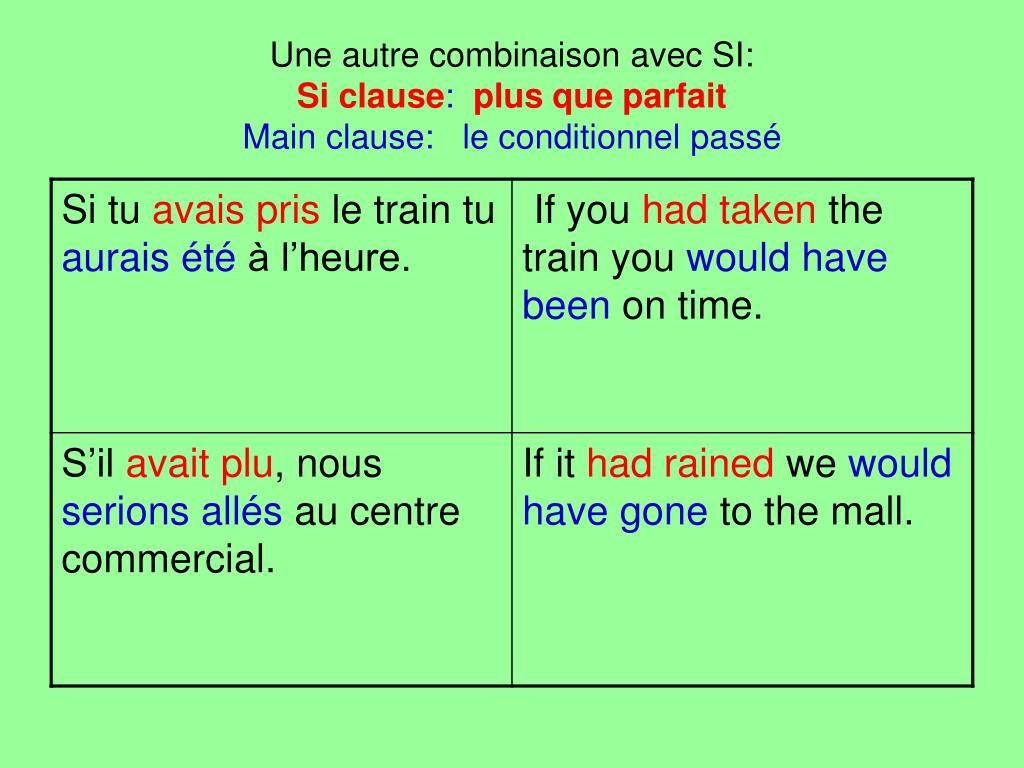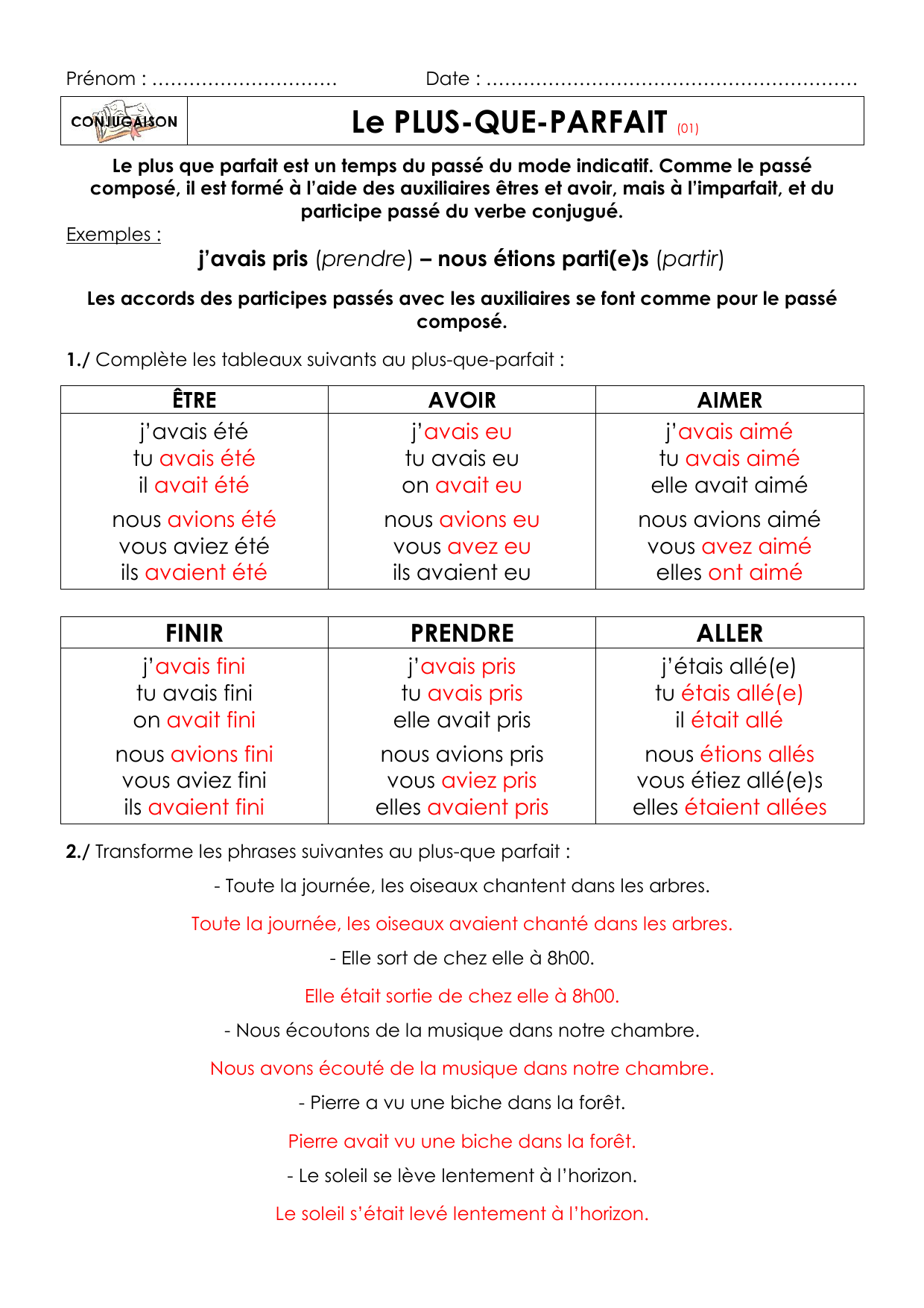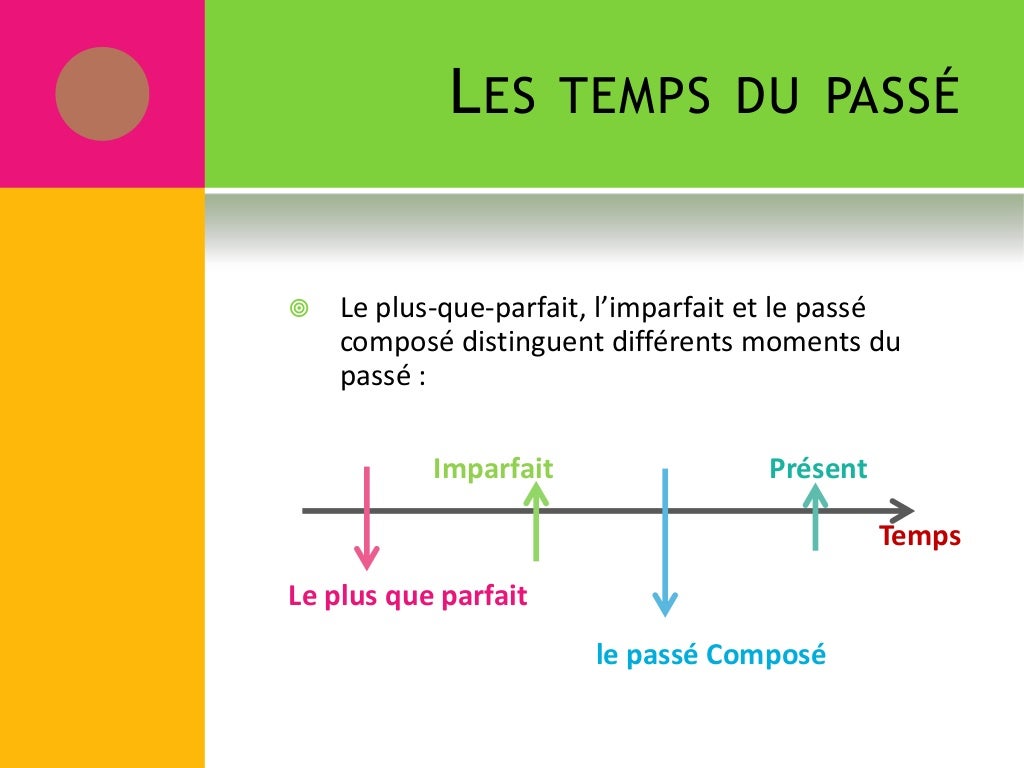
Il y a 23 phrases conditionnelles à compléter avec le présent, le futur
Step 1 We need to use "avoir" and "être" to create the basic form of this tense. In the imperfect tense, do you remember the conjugation of "avoir" and "être"? This is step number 1. The picture represents our stems. 2. Now we need to add the past participle. We use the same past participle as we do for "le passé compose."

Stream Conditionnel PlusQueParfait by 3dshot Listen online for free
Dans un style littéraire, on pourra utiliser le plus-que-parfait du subjonctif à la fois pour la condition et la conséquence; c'est d'ailleurs pourquoi ce dernier temps s'est déjà appelé conditionnel passé deuxième forme. Plus-que-parfait de l'indicatif et conditionnel passé
conditionnel, conditionnel passé, plus que parfait Match up
page: tac3 1.si + présent 2.si + imparfait 3.si + plus-que-parfait Si clauses (if clauses in English) indicate possibilities, which may or may not become reality. They refer to the present, past, and future. These conditional sentences have two parts: the condition, or si clause, and the main or result clause which indicates what will happen if the condition of the si clause is met.

PPT Le conditionnel présent PowerPoint Presentation, free download
Conditionnel présent : 'J'aime rais '. Le conditionnel de politesse. Conditionnel passé : 'J'au rais aimé'. Le regret. L'hypothèse - La condition - Constructions avec SI. Si + Présent > Futur. Si + Imparfait > Conditionnel présent. Si + Plus-que-parfait > Conditionnel passé.

Le PLUSQUEPARFAIT
The conditionnel pass. • for past hypothetical situations, using the construction Si + plus-que-parfait → conditionnel pass. La rumeur dit que Victor Hugo ne serait pas mort. Rumour has it that Victor isn't dead. Construction The past conditional is a compound tense.

grammaire français FLE hypothèse conditionnel imparfait plusque
Conjugate the French verb plus que parfait in all tenses: future, participle, present, indicative, subjunctive. Irregular verbs, auxiliary verbs, conjugation rules and conjugation models in French verb conjugation. Translate plus que parfait in context, with examples of use and definition.

Futur, Conditionnel, Plusqueparfait Quiz
Si clauses, also known as conditionals or conditional sentences, are used to express what could happen if some condition is met. Si clauses indicate possibilities which may or may not actually happen. They refer to the present, past, and future.

Упражнения на Plus que parfait et Conditionnel Passé 2 YouTube
Lorsque nous imaginons quelque chose qui n'a pas eu lieu, nous faisons une hypothèse sur le passé : Si + plus-que-parfait, conditionnel passé Exemples : Si je n'étais pas arrivé en retard, j'aurais vu le début du film. Exercice 1 Exemples : Ce matin, je ne joue pas au tennis parce qu'il pleut.

Plus que parfait conjugations crushasrpos
La structure Si + plus-que-parfait → conditionnel passé permet d'imaginer les conséquences dans le passé d'une action qui n'a pas eu lieu. Si j'étais parti à l'heure, je n' aurais pas raté mon train. (sous-entendu : Je suis parti en retard et j'ai raté mon train.) S'il avait fait beau, je serais sorti. (sous-entendu : il n'a.

Le plus que parfait
To conjugate the plus-que-parfait we use the imperfect forms of avoir and être as auxiliary verbs, followed by the participe passé (past participle) of the main verb. In negative sentences, the past participle comes after the second part of the negation (pas). Example: J'avais rigolé. → Je n' avais pas rigolé. J'étais parti.→ Je n' étais pas parti.

le conditionnel passé et le plus que parfait YouTube
To talk about an alternative past condition and its hypothetical outcome (I didn't have time), we use the plus-que-parfait in the if-clause and the conditionnel passé in the main clause. We often refer to this as the "unreal past" (l'iréel dans le passé). Example: Si j' avais eu le temps, je t' aurais aidée.

L'imparfait, Le Conditionnel Présent, Le PlusQueParfait Et Le
You will use the conditionnel passé when a past condition is implied. Please have a look at the following conditional sentence. Si elle était restée là-bas, il l'aurait rencontré. If she had stayed there, he would have met him. If she had stayed there [the condition], then he would met him.

Le conditionnel passé et le plus que parfait YouTube
Updated on January 28, 2019. The French past perfect, or pluperfect—known in French as le plus-que-parfait —is used to indicate an action in the past that occurred before another action in the past. The latter use can be either mentioned in the same sentence or implied.

Futur, Conditionnel, Plusqueparfait Quiz
Si + Plus-que-parfait et Conditionnel passé Dans l'exercice ci-dessous, utiliser des formes au masculin. Avancé Tweeter Partager Exercice de français "Si + Plus-que-parfait et Conditionnel passé" créé par anonyme avec le générateur de tests - créez votre propre test ! Voir les statistiques de réussite de ce test de français

La relation entre le plusqueparfait et le conditionnel passe YouTube
French has 10 indicative tenses, but not all of them are used in everyday language: Le passé simple (the past historic) and le passé antérieur (the anterior past) are only used in literature, while le présent (the present), le passé composé (the simple past), l'imparfait (the imperfect), le passé récent (the recent past), le plus-que.

Conditionnel plus que parfait Tongue Rider7
Mettez les verbes entre parenthèses au plus-que-parfait ou au conditionnel passé. Si tu (s'amuser) au match de hockey, tu (ne pas entrer) tôt. I am not sure how I can make sense of that using either tense. I have taken a guess with: Si tu t'étais amusé au match de hockey, tu n'aurais pas pu entrer plus tôt. But that still doesn't make.